So you’re not a gardener. It might be because you tried to grow tomatoes with disastrous results, or maybe just because you don’t think you have the room or free time to make a garden happen. Whatever your reason for being a plantaphobe, I’m here to give you a few reasons to stop blaming your black thumb and give it another shot.
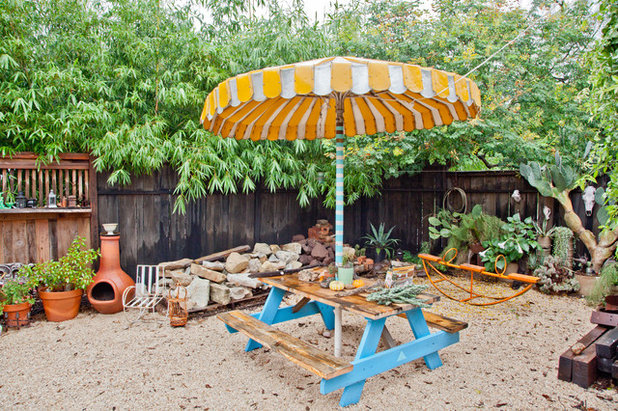
Sarah Natsumi Moore
1. “I kill everything I touch.” Ah, the dreaded curse of the black thumb. My first bit of advice is to not only accept that your plants will eventually die or become disfigured by pests or diseases, but count on it. Practice makes perfect; every plant you kill will make you a better gardener, because you then understand more about what that plant needs to thrive.
To prevent your plant’s untimely demise, keep an eye out for cues such as yellowing leaves, rotting roots, low overall vigor and anything else out of the ordinary, so you can do a bit of research to take the necessary steps to turn things around.
Sometimes plants are purchased with one foot already in the grave, then they fall to pieces within a week of purchase. It’s not your fault! The people in the garden department of your local big-box retailer aren’t trained to know each individual plant’s requirements, so it’s very common for shade-loving perennials to get merchandised in the sun, or for plants without drainage holes to get watered to death. Oftentimes the newly purchased plant is already infested with disease or pests. Return the deceased (or soon-to-be-deceased) plant and head to a reputable garden center before you blame your black thumb.
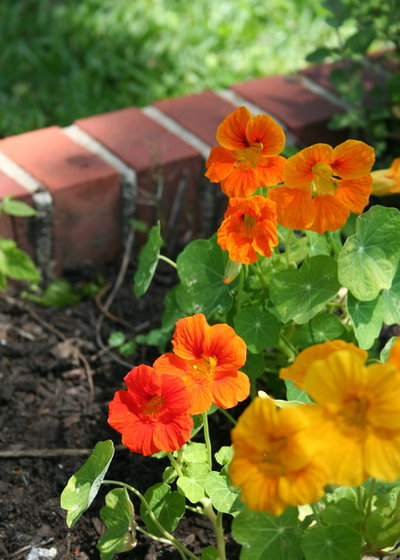 2. “Gardening is too expensive.”
2. “Gardening is too expensive.” Gardening really can become quite pricey if you don’t know how to spend your money wisely, but it’s still a very affordable hobby if you know where (and how) to shop. I’ll let you in on a little secret: Plants go on sale too. When I first started gardening, I acquired most of my plants from the bargain sections of garden centers. I would buy plants that were frozen to the roots, orchids that weren’t in bloom and anything else I could snatch up for a steal.
The next best thing is to go rogue and get plants for free as cuttings, divisions and seeds from other gardeners. I’m also a big fan of garage sales, plant sales and repurposing things for the garden. I’ve even turned a birdcage into a planter! Oh, and here’s some food for thought: You might think you can’t afford to garden, but it’s hard to argue with the vegetable garden in my front yard that probably cost me no more than $20 and has already supplied well over that amount’s worth of food.
 3. “I can’t even keep tomatoes alive.”
3. “I can’t even keep tomatoes alive.” I hear this one a lot, and I am quick to reply that tomatoes can be a real pain. Grow something else instead. It really is true. While tomatoes are easy once you get the hang of them, there are few plants that will frustrate a beginning gardener as thoroughly as the tomato and its host of diseases, hornworms, cutworms and stenchmonkeys (OK, I made that last one up). You wouldn’t learn to cook by choosing the most complicated recipe in the cookbook, would you?
Start with something easy before you give up on gardening. Is there a plant you see in all of the doctor’s offices, parking lot medians and front yards? Grow one of those instead. When I maintained a garden for my mother, each plant had to be seriously low maintenance, since I didn’t have much time to garden when I visited every one to two weeks. If a plant couldn’t make it in dry and sandy soil, I moved on.
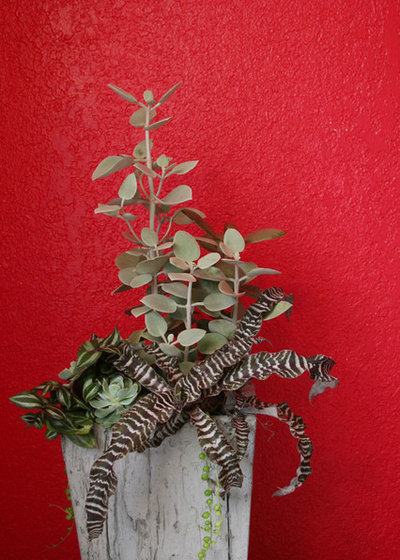 4. “Gardening is for [insert stereotype here].”
4. “Gardening is for [insert stereotype here].” The container combo shown here is not typical. I don’t care if you’re a 20-year-old hipster college student with a bitter disdain for all that’s boring mainstream; there’s a garden for everyone, regardless of taste.
Sure, you can grow “granny flowers” if you feel compelled to do so (even if only for the sake of irony), but it’s a lot more fun to look for plants that nobody else is growing, like moustache plant (
Aloe suprafoliata, zones 10 to 11), heirloom veggies and herbs for your foodie fix or any of the otherworldly carnivorous plants available for those with a discriminating palette. I’m personally a fan of window plants (
Haworthia sp, zones 10 to 11), with clear jelly-like leaves, and tropical bromeliads, like the oddly cold-tolerant
Aechmea apocalyptica (zones 8b to 11), with its insanely wicked flower spike of red and gray.
The thing about plants is that they really don’t care what we think about them in the first place, which is pretty badass if you ask me.
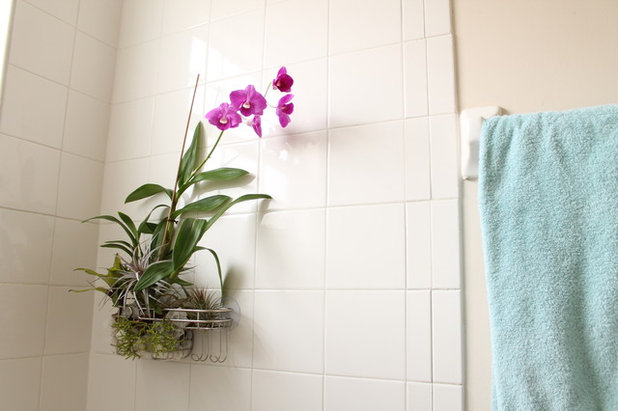 5. “I don’t have room to garden.”
5. “I don’t have room to garden.” Yes, you do. You don’t need a yard, a patio or even a tabletop to plant your very own oasis of greenery. When I lived in an apartment, I eventually devised new ways to grow plants vertically in containers on my shady balcony. Now that I have a garden of my own, I’m still determined to make the most of small spaces and have even turned a shower caddy into an impromptu orchid garden that needs nothing more than an occasional spray of water and a little bit of orchid food. The trick to working with the space you have is to find plants that will thrive there in the first place — finding out what those plants are is a learning process.
My balcony was too dark for the flowers, succulents and vegetables that I really wanted to grow, but it turned out to be just right for houseplants. After I forgot to water them for weeks at a time, all that survived were orchids, bromeliads and other plants that naturally grow in the treetops, which have similar conditions of shade and drought. Each plant that died made more room for plants that would actually succeed in their place. Another trick: Grow compatible plants in the same container and you’ll save time, money and space.
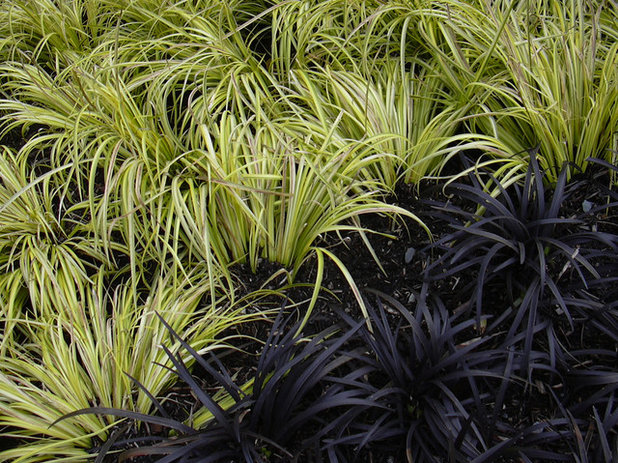 6. “I don’t have time to garden.”
6. “I don’t have time to garden.” Then grow plants that don’t really have time for you either, whether they’re houseplants or low-maintenance landscape plants like
golden sweet flag (
Acorus gramineus ‘Ogon’, zones 5 to 10) and black mondo grass (
Ophiopogon planiscapus ‘Nigrescens’, zones 5 to 10).
Succulents and cacti in containers are a perfect fit for people who are short on outdoor space and time, because they require the bare minimum of water and ask only for a sunny windowsill. Snake plants (
Sansevieria species),
mistletoe cactus (
Rhipsalis species) and
cast-iron plants (
Aspidistra elatior) will do well with less light too.
If you have a yard to mow every weekend, low-maintenance ground covers, shrubs and trees will actually cut down on your lawn work eventually and require very little time themselves. Vegetable gardens do take a bit of time on your part, but it’s totally worth it, because eventually they’ll save you the hassle of going out to eat or getting groceries.
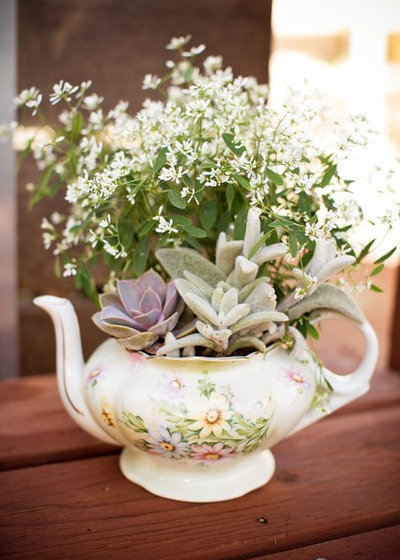
Singing Gardens
7. “I got a plant as a gift once, but it died.” With few exceptions, any plant you receive as a gift is bound to die on you before long — well, at least without a drastic intervention on your part. That plant with the pretty flowers on your hospital nightstand is probably an annual and will die regardless of how you treat it. That dish garden on your dresser is a disaster waiting to happen, because it contains a bunch of different plants that don’t even like the same conditions (cactus and ferns, anyone?), and since it doesn’t even have a drainage hole, the roots will likely rot in standing water unless the plants are repotted … after you “get well soon,” of course.
(By the way, the designer of this arrangement did drill a hole at the bottom of this teapot to let water drain out.)
You really have to wonder about how many people think they can’t garden because they couldn’t keep a gift alive. Even tough plants like amaryllis (
Hippeastrum) and Easter cactus (
Hatiora gaertneri) will perish if you don’t know what to do with them. For easily frustrated would-be gardeners presented with a plant as a gift, my suggestion is to either learn about the plant and give it what it needs, or throw it away and get a plant you actually want.





